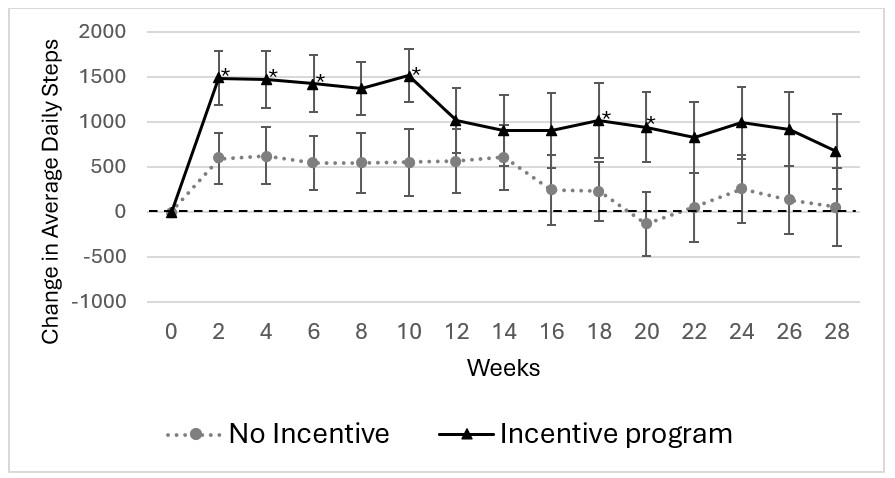Session Information
Session Type: Poster Session C
Session Time: 10:30AM-12:30PM
Background/Purpose: Promotion of physical activity is important in the management of knee osteoarthritis (KOA), though effective strategies for behavioral change to promote exercise are lacking. The aim of the study was to determine if an incentive program based on principles from behavioral economics including gamification and social incentivization could promote physical activity and reduce self-reported pain and disability in adults with KOA.
Methods: This was a factorially-designed multi-site randomized controlled clinical trial. Participants were randomized to receive an incentive program to promote greater physical activity or an attention control. Participants received a Fitbit monitor and completed patient-reported outcomes through a web-based platform. Participants who were randomized into the incentive program received points for achieving step goals and advanced in a game on a weekly basis based on their success. The control arm received a Fitbit and answered surveys but did not receive an incentive. Participants were also randomized to receive blinded corticosteroid injections v. lidocaine only in a factorial design. The analysis used mixed-effects models to evaluate the time-averaged effect of the intervention over a 28-week study follow-up on both average daily step counts (averaged over 2 weeks) as well as secondary patient-reported outcomes, including the Knee Osteoarthritis Outcome Score (KOOS). Secondary outcomes also included the Patient-Reported Outcomes Measurement Information System (PROMIS) pain assessments.
Results: Of 231 that were enrolled, 221 were randomized with an average age of 64 years and 84% male. Those that were randomized to the incentive (Nf110) walked an average of 830 (95% CI: 254, 1405) more steps/day than the control arm (Nf111) (p=0.005). The increase in steps/day compared to the control arm was similar across the 28-week study (Figure 1), though step counts generally declined with time in both groups. There were no significant differences in the effect of the intervention on the change in step counts by gender, Kelgren-Lawrence grade, baseline step count, or receipt of corticosteroid (v. lidocaine only) (Figure 2). While the incentive program resulted in an improvement in average daily step counts, there was no difference in the change in KOOS scores over the study period in the incentive group compared to the control group [β: -1.59 (95% CI: -4.51, 1.33) p=0.29] (Figure 3). The incentive group also did not report significant differences in change in pain intensity, pain behavior, or pain interference.
Conclusion: An incentive program designed with elements of gamification and social incentivization resulted in a significant increase in average daily steps compared to a control arm in participants with KOA. This difference equates to about a 10–15-minute walk or ½ mile a day and is considered meaningful. While there was improvement in activity, this study does not support prior evidence suggesting that an increase in walking will result in an improvement in symptoms. However, longer duration of sustained increased activity may be needed for symptomatic benefits. Notably the greater activity in the incentive arm did not result in worsening of symptoms.
 Figure 1: Change in average weekly step count changes in incentive (black triangles) and control groups (grey circles). Brackets indicate 95% confidence interval.
Figure 1: Change in average weekly step count changes in incentive (black triangles) and control groups (grey circles). Brackets indicate 95% confidence interval.
.jpg) Figure 2: Effect of the intervention (difference between incentive and control by subgroup). Brackets indicate 95% confidence interval.
Figure 2: Effect of the intervention (difference between incentive and control by subgroup). Brackets indicate 95% confidence interval.
.jpg) Figure 3: Change in the total KOOS score over 28 weeks among the incentive (black triangles) and control (grey circles) groups. Brackets indicate 95% confidence intervals.
Figure 3: Change in the total KOOS score over 28 weeks among the incentive (black triangles) and control (grey circles) groups. Brackets indicate 95% confidence intervals.
To cite this abstract in AMA style:
Hayes K, England B, Wysham K, Quinones M, Olave M, Wetzel S, Brubeck H, Gillcrist R, Lavery C, Keller N, Ateh B, Kramer B, Xiao R, Jin K, Ogdie A, White D, Neogi T, Scanzello C, Baker J. Gamification and Social Incentivization to Promote Physical Activity in Adults with Knee Osteoarthritis: Results from a Multi-Site Randomized Trial [abstract]. Arthritis Rheumatol. 2025; 77 (suppl 9). https://acrabstracts.org/abstract/gamification-and-social-incentivization-to-promote-physical-activity-in-adults-with-knee-osteoarthritis-results-from-a-multi-site-randomized-trial/. Accessed .« Back to ACR Convergence 2025
ACR Meeting Abstracts - https://acrabstracts.org/abstract/gamification-and-social-incentivization-to-promote-physical-activity-in-adults-with-knee-osteoarthritis-results-from-a-multi-site-randomized-trial/
